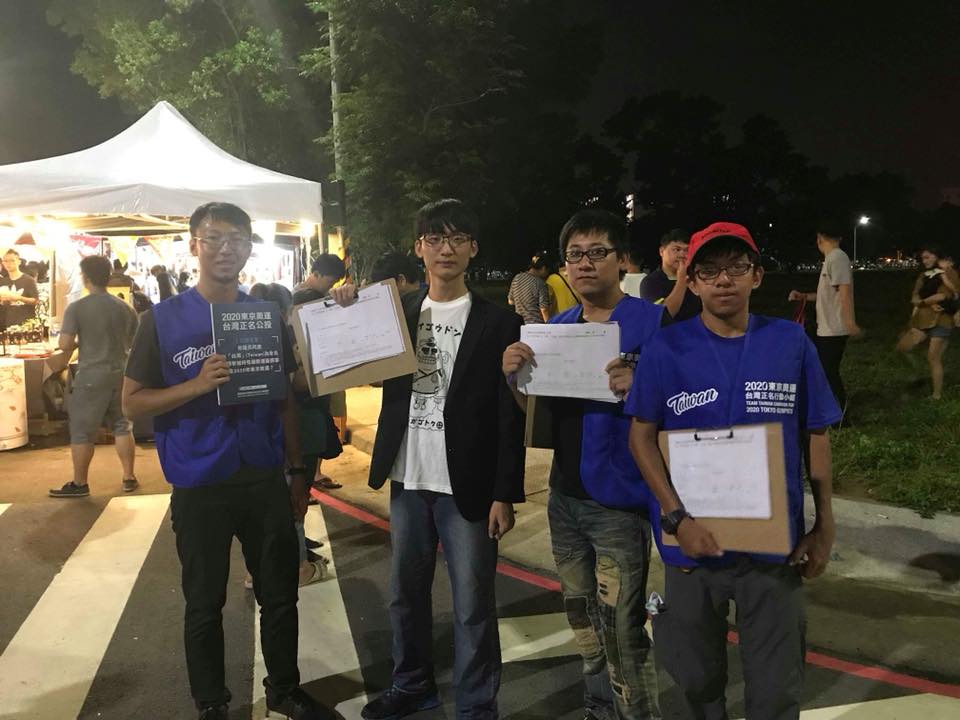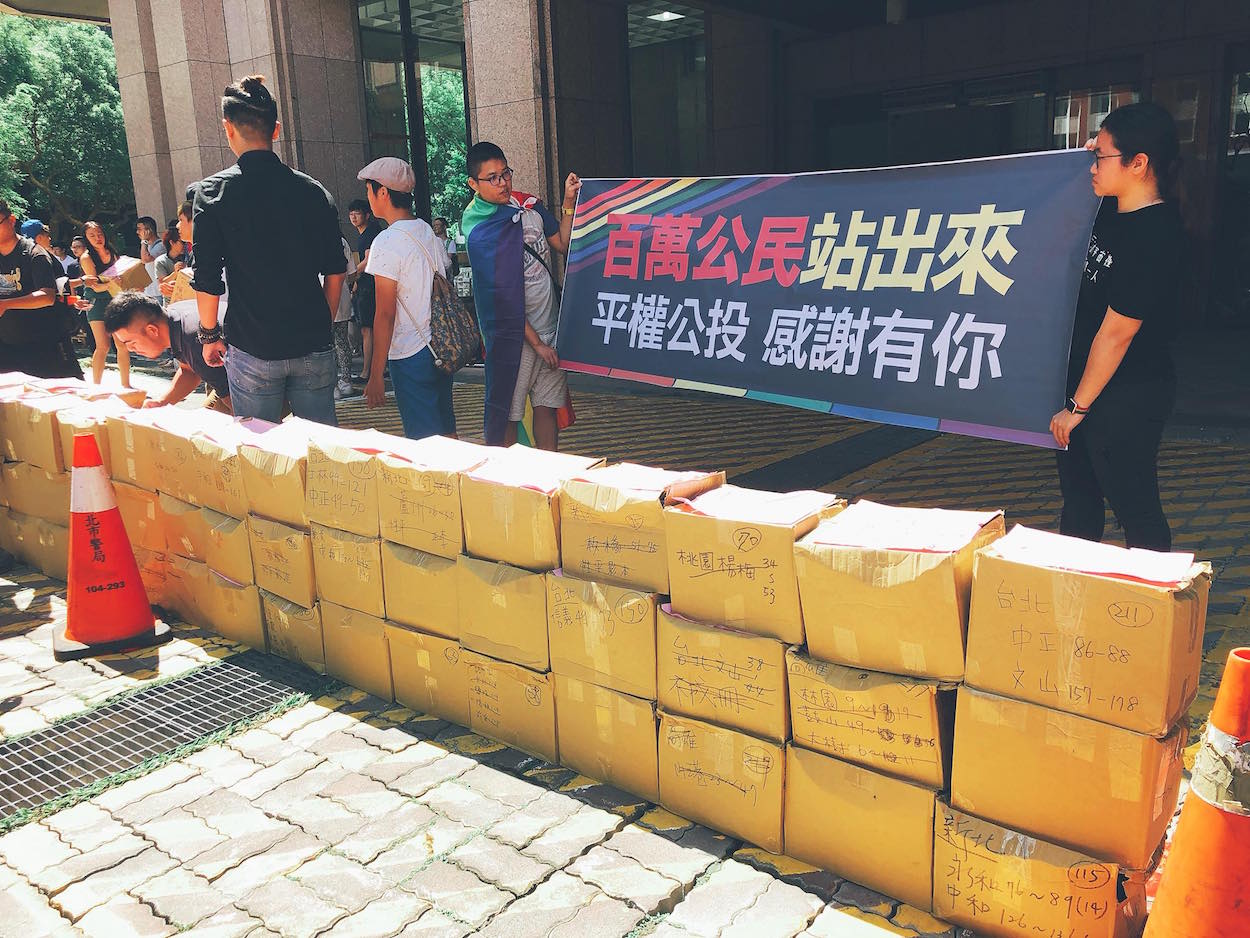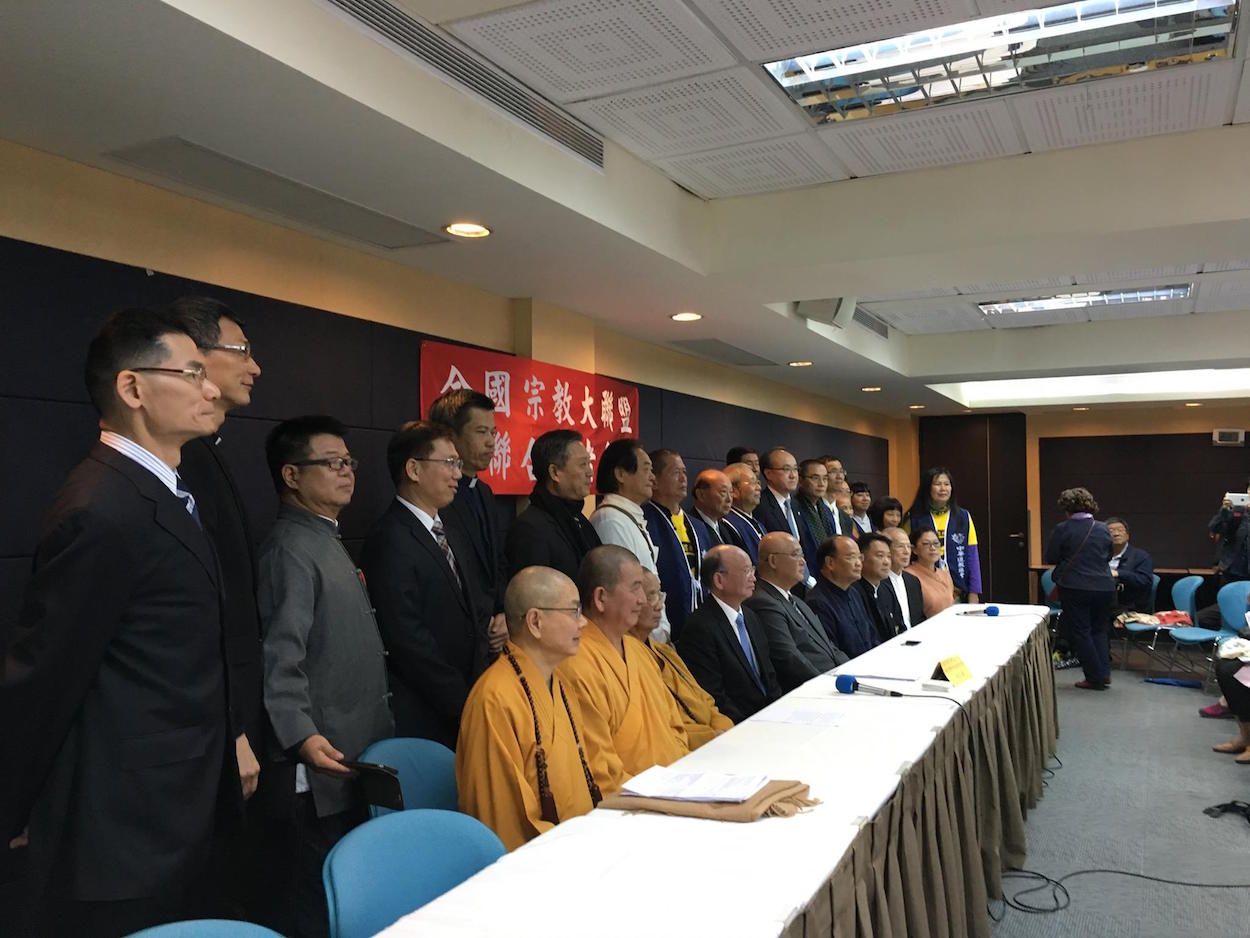by Brian Hioe
語言:
English
Photo Credit: Team Taiwan/Facebook
IN PAST MONTHS, one has observed a number of conflicting referendum proposals achieving the necessary political benchmarks to be held. The number of referendum proposals currently on the table is inclusive of referendums calling for gay marriage, against gay marriage, for nuclear power, for coal power, and for changing the name under which Taiwan is to participate in 2020 Tokyo Olympics.
 Campaigning for the 2020 Tokyo Olympics referendum. Photo credit: Team Taiwan/Facebook
Campaigning for the 2020 Tokyo Olympics referendum. Photo credit: Team Taiwan/Facebook
This is the result of lowered benchmarks for holding a referendum in Taiwan after the amendment of the Referendum Act in December 2017. This fulfilled a demand long pushed for by the pan-Green camp, to lower the benchmarks for holding a public referendum in Taiwan.
Under regulations changed after December 2017, for a referendum to be held, first .0001 percent of the electorate about 1,800 individuals, need to agree to hold the referendum, a drastic decrease from the previous benchmark of .005%, about 90,000. For a referendum to pass the second level benchmark requires 1.5 percent of the electorate to agree to the referendum, a decrease from 5%, that is, a decrease from 900,000 individuals to 280,000 individuals. Lastly, for a referendum to be approved in the final stage of voting now requires 25% of the electorate rather than 50% of the electorate to agree to it, a decrease of 9 million voters to 4.5 million voters. It may not be surprising, then, that a number of referendum proposals would be launched immediately after changes to the Referendum Act.
The pan-Green camp historically has had its eye on lowering referendum benchmarks as a way of permanently settling issues regarding Taiwan’s lack of de jure independence. However, the amended Referendum Act did not allow for referendums to be held on constitutional issues or issues regarding Taiwan’s nationhood.
Indeed, as in many ways the dominant deep Green party, the New Power Party (NPP) has indicated that it intends to push again for amendments to be made for the Referendum Act in order to allow for this to happen. This occurs despite that the party has sometimes been coy about whether it would seek a referendum on Taiwanese independence in the past.
 Boxes full of ballots for the pro-LGBTQ marriage equality referendum. Photo credit:平權前夕.彩虹起義
Boxes full of ballots for the pro-LGBTQ marriage equality referendum. Photo credit:平權前夕.彩虹起義
Yet more broadly, the referendum has not proven solely the domain of the pan-Green camp. One observes that a number of referendum proposals pushed for at present have mainly been motivated by pan-Blue political actors, as visible in KMT-led referendum efforts against the construction of a coal plant in Ruifang and for the use of nuclear power in Taiwan.
Accordingly, the referendum has proven an expedient political tool for both pan-Green and pan-Blue political actors. Nevertheless, at the same time, some members of the public view the fact that so many referendum proposals have appeared after changes to the Referendum Act as having led to social disruption.
Of course, in truth, it has been both pan-Blue and pan-Green actors pushing for various referendums. Moreover, it is significant to note that eventual amendment of the Referendum Act in 2017 was not solely the product of pan-Green advocacy, but actually involved some level of bipartisan support, seeing as both the pan-Green and pan-Blue political camps realized the political expediency of changes to the Referendum Act. But because lowering the benchmarks needed to hold a political referendum in Taiwan has historically been the demand of the pan-Green camp, it is more usually the pan-Green camp blamed for social disruption caused by lowering the Referendum Act, with blame particularly attributed to the NPP.
With a number of conflicting referendum proposals currently on the table, however, it may be that avoiding controversial will be impossible for the relevant government organs responsible for implementing the political referendum in Taiwan. For one, most obviously, with two referendums on gay marriage on the table, one with wording favorable to gay marriage pushed for by marriage equality advocates and one with wording slanted against gay marriage pushed for by anti-gay groups, the Central Election Commission (CEC) may have to find some way to unify both sets of referendum questions without incurring too much wrath from either side.
 Press conference held by the anti-gay group, the Protect the Family Alliance. Photo credit: Protect the Family Alliance/Facebook
Press conference held by the anti-gay group, the Protect the Family Alliance. Photo credit: Protect the Family Alliance/Facebook
It is also wholly possible that the CEC may rule that some election proposals are unconstitutional. It is possible, for example, that the CEC will rule that changing the name under which Taiwan participated in the 2020 Tokyo Olympics hits too close to home regarding questions of Taiwan’s nationhood and will try to prevent this from being voted on through a public referendum.
Nevertheless, seeing as the referendums which successfully achieve their election benchmarks have done so by mobilizing large numbers of supporters, one can expect public anger no matter what the Central Election Commission decides upon for controversial referendum questions. Yet this too, may be fundamentally in the nature of democracy, insofar as the referendum would be a form of direct democracy.

